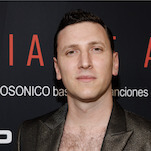The 50 Best Movies of 2013
10. Muscle Shoals
Director: Greg “Freddy” Camalier
Freddy Camalier’s masterly Muscle Shoals is about the beginnings and heyday of the recording scene in Muscle Shoals, Ala., a tiny town that improbably changed the face of rock ‘n’ roll, putting out along the way some of the greatest records in the history of American music. Many of those moments are recounted to great effect in the film; first-timer Camalier is obviously a natural storyteller. But there’s so much more to the doc—the cinematography is lush and beautiful, the editing is crisp and precise, and it’s in turns heartbreaking, inspiring, wry, thought-provoking, nostalgic and genuinely funny. It’s simply a stunning debut film. It helps that Camalier and his producing partner Stephen Badger are after more here than just a dry lesson in musical history. They delve into the Civil Rights Movement and its effect specifically on Alabama, especially as it relates to a Muscle Shoals music scene that was, shockingly enough, lacking in any racial tension. They return again and again to the ancient Native American legend about the river that flows through the town and the water spirit who lived there, sang songs and protected the town. And the personal life of Fame Records founder Rick Hall, the protagonist of the film, is itself worthy of a Faulkner novel. It’s thrilling, it’s engaging, it’s fascinating, it’s stirring. It’s the best documentary of the year, whether you’re a music lover or not.—Michael Dunaway (review here)
9. Frances Ha
Director: Noah Baumbach
Frances Ha is endearing, kind and, in many ways, Noah Baumbach’s best movie to date. One could trace his films, from his debut (Kicking and Screaming) to his most recent (Greenberg) and see a slow but steady focus on the individual, as well as his abandonment of an ironic, sometimes caustic stance against the very characters he writes. It is as if Baumbach could only write a certain type of person—the privileged, socially crippled intellectual with either too much self-awareness or none at all—and for a while it seemed like even the writer himself couldn’t stand to be in the same room with such characters. This anger has faded, and what has emerged over his last few films, and culminated in Frances Ha, is an embrace of not only the flaws of his characters, but also his flaws as a filmmaker. He has settled down and created a film imbued with love, fun and melancholy. It feels simple and open and is a joy to watch.—Joe Peeler (review here)
8. Leviathan
Directors: Lucien Castaing-Taylor, Verena Paravel
“The film is a gesture, a physical and emotional reaction to our experience, almost like an epileptic crisis or something—an aesthetic translation of what we have been subjected to.” That’s how co-director Véréna Paravel describes her documentary Leviathan, an utterly ravishing and pummeling impressionistic account of life on a high-seas fishing boat. Instead of storylines or talking-head interviews, Paravel and her partner Lucien Castaing-Taylor’s film simply plunges us into the terror and isolation of a brutal, dangerous job, its cameras diving into the ocean or following along as a fish gets caught in the net on its way to being gutted. You don’t learn many facts about commercial fishing from Leviathan, but you leave the movie convinced you understand it on a primal, cathartic level, which is how art sometimes works best.—Tim Grierson
7. Mud
Director: Jeff Nichols
Two years ago, Jeff Nichols turned heads at Sundance with his second film Take Shelter,as did his fast-rising stars Jessica Chastain and Michael Shannon. He was back this year, this time in the Spotlight section, with Mud, a coming-of-age thriller about two young boys who encounter a man on the run in rural Arkansas. It’s a sweet tale that displays plenty of faith in humanity without ever veering into sappiness and always keeping you on the edge of your seat—just the kind of thing you hope to find at a festival like Sundance. And Nichols once again coaxes amazing performances from his cast.—Josh Jackson (review here)
6. 12 Years a Slave
Director: Steve McQueen
Steve McQueen’s exquisitely filmed, harrowing chronicle recounts the dozen years that Solomon Northup (Chiwetel Ejiofor) spent as chattel in the Deep South with an unflinching eye that forces viewers to confront the horrors of slavery. 12 Years a Slave is frequently masterful—in its fluid, novelistic chronology; in its transcendent aesthetics; in its insistence on making you not only look, but see, until you’re left breathless. It’s slightly deflating then, that the sum of the parts is less than the whole. After all that’s come before, the ending, for all its well-earned emotion, goes exactly as one would expect, with none of the distress underlying the rest of the film—and thus none of the visceral reaction either.—Annlee Ellingson (review here)
-

-

-

-

-

-

-

-

-

-

-

-

-

-

-

-

-

-

-

-

-

-

-

-

-

-

-

-

-

-

-

-

-

-

-

-

-

-

-

-








































